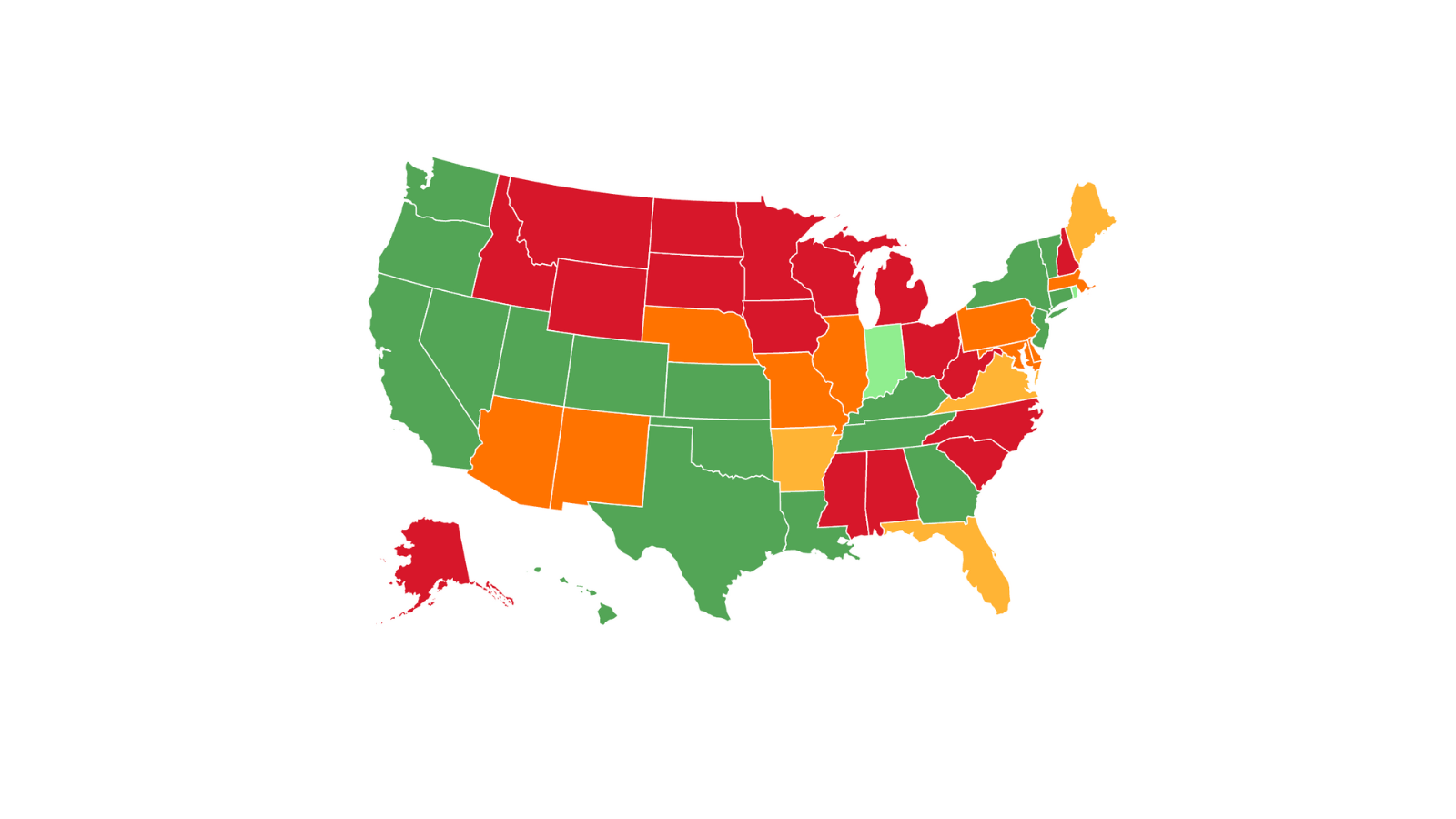NOTE: This blog post will provide updates on the states that have enacted new or improved existing anti-SLAPP laws since the November 2023 publication of our Anti-SLAPP Report Card.
January 8, 2025: Ohio Joins the Anti-SLAPP Movement: A Victory for Free Speech
Today marks a historic moment for free speech in Ohio as Governor Mike DeWine signed Senate Bill 237, which enacts the Uniform Public Expression Protection Act (UPEPA) into law. This landmark legislation makes Ohio the 35th state to have a law in place providing crucial protections against strategic lawsuits against public participation, commonly known as SLAPPs.
Prior to the new law’s passage, the absence of anti-SLAPP protections in Ohio left its citizens vulnerable to frivolous lawsuits designed to silence public expression and criticism. These SLAPP suits, typically filed by wealthy individuals or organizations, have been weaponized to intimidate critics, forcing them into silence through the sheer burden of legal costs.
The Institute for Free Speech’s 2023 Anti-SLAPP Report Card awarded the state an “F” grade for not having any statutory protections against this pernicious form of lawfare.
The new law changes this landscape dramatically. Under UPEPA, plaintiffs must now justify their lawsuits on constitutional grounds early in the legal process. This crucial change prevents the use of lengthy, expensive litigation as a tool for intimidation and harassment. When someone files a lawsuit targeting protected speech, defendants can quickly challenge the merits of the case before incurring substantial legal costs and a time-consuming, intrusive discovery process.
The law’s key provisions offer robust protections for free speech:
-
-
- Cases can be evaluated on constitutional grounds at the start
- Defendants gain the right to immediate appeal if an anti-SLAPP motion is denied
- Winning defendants can recover their legal costs and attorney fees
-
Two provisions were added by the House Judiciary Committee to further strengthen the legislation, as explained in this memo summarizing the House amendments:
-
-
- “States that the chapter proposed to be enacted is intended to confer substantive immunity from suit, and not merely immunity from liability, for any cause of action concerning protected speech under the bill.”
- “Provides that the court must not fail to award, or reduce an award of, attorney’s fees, court costs, and other reasonable litigation expenses on the grounds that the representation of the moving party was undertaken on a pro bono or contingent basis.”
-
These provisions are not just about protecting journalists or activists. Rather, they safeguard every Ohioan’s right to speak freely on matters of public concern. Whether when posting an online review, reporting harassment, or speaking at a public meeting, citizens will now have legal protection against retaliatory litigation.
UPEPA will also discourage meritless suits from being filed in the first place. By deterring frivolous lawsuits designed to silence speech, the new Ohio law creates an environment where more people will be able to safely express their views and participate in public discourse. This is particularly crucial in an era where online communication has become a primary forum for public debate.
UPEPA passes in Ohio because of years of dedicated work by many individuals and organizations. Special thanks go to State Senators Theresa Gavarone and Nathan Manning, the lead sponsors of this crucial legislation, and to Gov. DeWine for signing it into law. We also thank the countless activists, attorneys, especially Jeffrey Nye, and organizations who worked to make this day possible.
July 17, 2024: Pennsylvania Enacts Robust New Anti-SLAPP Law
In a significant victory for free speech, Pennsylvania has enacted a strong new anti-SLAPP law, bolstering protections for all residents of the commonwealth. House Bill 1466 (HB 1466), signed into law by Governor Josh Shapiro on July 17, addresses a crucial weakness in the state’s previous legislation that left Pennsylvanians vulnerable to costly lawsuits for speaking out on matters of public concern.
The new law targets strategic lawsuits against public participation (SLAPPs), typically frivolous defamation suits brought by well-funded plaintiffs aimed at silencing individuals exercising their First Amendment rights. By enacting this legislation, Pennsylvania has joined the growing number of states taking decisive action to protect citizens from lawsuits that undermine free speech.
HB 1466, based on the nonpartisan Uniform Law Commission’s model Uniform Public Expression Protection Act (UPEPA), significantly expands upon Pennsylvania’s previously limited anti-SLAPP provisions. While the old law generally only protected communications to government agencies about environmental laws and regulations, the new legislation extends protections to all expression on any matter of public concern.
Under the new law, Pennsylvanians are now safeguarded when speaking out on a wide range of topics, including taxes, abortion, education, healthcare, guns, and transportation. Even everyday actions like posting online reviews are now shielded from potential SLAPPs.
Key provisions in the legislation will deter frivolous lawsuits and minimize litigation costs for defendants. These include requiring plaintiffs to demonstrate a legitimate case early in proceedings, granting defendants the right to immediate appeal if an anti-SLAPP motion is denied, and mandating that successful defendants recover court costs and attorney’s fees.
The passage of this law marks a dramatic improvement in Pennsylvania’s free speech protections. In the Institute for Free Speech’s 2023 Anti-SLAPP Report Card, we had given the state a “D-minus” grade, with an overall score of just 25 out of 100 points. By expanding the scope of protected speech to include all issues of public concern, this new legislation significantly raises Pennsylvania’s standing. Through this action, the state has aligned itself with a growing national trend towards enhanced free speech protections.
By enacting HB 1466 into law, Governor Josh Shapiro ushers Pennsylvania into the ranks of neighboring states like New York (A+) and New Jersey (A), which have strong anti-SLAPP laws already in place.
We want to thank Pennsylvania House Representative Ryan Bizzarro and many other legislators who backed the bill early, as well as Governor Shapiro and our friends and allies in the free speech movement for their hard work in seeing this legislation become law. This is a major victory for free expression in Pennsylvania. The new law ensures that residents can speak out on issues of public concern without fear of facing ruinous lawsuits, fostering a more open and robust public dialogue throughout the commonwealth.
May 24, 2024: Minnesota Enacts Robust Anti-SLAPP Law
In a win for free speech and improved public discourse, Minnesota Governor Tim Walz has signed into law a robust new anti-SLAPP statute (HF 5216). SLAPP stands for “Strategic Lawsuit Against Public Participation.” SLAPPs are a form of frivolous lawsuit often filed by wealthy individuals or entities with the goal of intimidating critics and draining their resources through lengthy, expensive legal battles.
The new Minnesota law adopts the Uniform Law Commission’s model Uniform Public Expression Protection Act. It contains the key features outlined by free speech advocates across the political spectrum to create a strong deterrent against SLAPP suits:
- It protects all speech on matters of public concern, not just specific categories like statements to the government.
- Defendants can file a special motion to quickly dismiss meritless claims and halt burdensome “discovery” processes until the court rules.
- Plaintiffs must substantiate their claims and show a legitimate case early on to overcome an anti-SLAPP motion.
- Defendants can immediately appeal if their anti-SLAPP motion is denied, avoiding a punishing trial.
- If defendants prevail, they are awarded costs and attorneys’ fees—a crucial fee-shifting provision to deter SLAPPs.
With these robust provisions, Minnesota residents can speak out on public issues without fearing retaliatory legal actions designed to bankrupt and bully them into silence. The anti-SLAPP law creates a more equitable playing field for speakers of all means against the deep pockets of corporations or suit-happy individuals who might try to suppress criticism.
Free speech is a bedrock American principle that Minnesota has rightly acted to safeguard. This new law is a vital shield against meritless litigation that undermines our democracy and public discourse. Minnesotans can now debate issues freely, more secure in the knowledge that the law provides the important tools to fight off any SLAPPs.
Minnesotans once enjoyed a modicum of protection against SLAPP suits until the state supreme court ruled that law unconstitutional in 2017. In the intervening years, the Institute for Free Speech awarded Minnesota an “F” grade for not having any protection for speakers who want to speak out publicly on matters of concern. As of this week, Minnesota has become the 34th state to inoculate their citizens against this malicious form of lawfare. The new law is free of the defects present in the old law and is likely to withstand any challenges to it in court.
The new anti-SLAPP law originated as HF3309 and SF3317, but later became part of a larger bill that addressed “public safety and judiciary budget and policy provisions.” That omnibus bill was signed by the governor on May 24, 2024 and the new anti-SLAPP law took effect the following day. It applies to “applies to a civil action pending on or commenced on or after” the effective date.
We applaud Minnesota House Representatives Cedrick Frazier and Harry Niska, and Senators Bonnie Westlin and Michael Kreun, as well as Governor Walz, for their hard work shepherding this important reform across the finish line.
April 13, 2024: Maine Enacts Robust Anti-SLAPP Law
Maine’s current anti-SLAPP law covers a limited amount of speech and falls short on several vital procedural protections. A new and improved bill (SP 367) became law on April 13 and will take effect on January 1, 2025.
Maine is one of many states where a bill passed by the legislature can become law without the governor’s signature. In Maine, if the governor does not veto a piece of legislation within ten days of receiving it, the legislation becomes law, which happened here.
Maine’s existing anti-SLAPP law earned a C- in our 2023 anti-SLAPP report card because of three flaws in the 1995 statute. First, the law covered speech only in public proceedings, which meant that many types of speech and speech in other forums, such as online, were not protected. Second, there was no provision for an immediate appeal (interlocutory appeal) if an anti-SLAPP motion was denied, saddling defendants with burdensome discovery and often a trial in a frivolous case. Finally, the statute only gave courts the option, not the requirement, to award attorney fees and court costs to prevailing defendants, which could discourage legal representation for defendants with limited resources.
The new law, modeled on the Uniform Law Commission’s model Uniform Public Expression Protection Act (UPEPA), corrects these failings by expanding the covered speech to include oral, print, and online forums. It provides an opportunity for interlocutory appeal and requires an award of attorney’s fees and reasonable costs when an anti-SLAPP motion is approved. Therefore, we expect Maine’s new law to earn a top grade for the state.
As is often the case, the measure passed both chambers without opposition.
As a result of the hard work of the bill’s sponsors, led by Senator Michael Tipping, and many civil liberties allies, residents of the Pine Tree State will enjoy new protections against frivolous lawsuits related to free speech.














